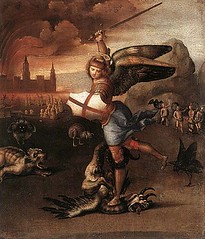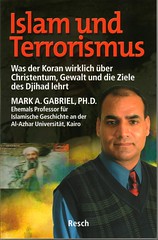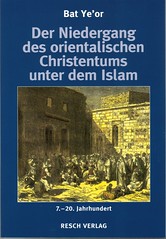President Bush's repeated assertions about the peaceful nature of Islam were briefly interrupted when the State Department issued the annual report required by the International Religious Freedom Act of 1998. This year, as in the past, our Muslim-world partners in the coalition against terrorism were prominently featured among the most violent, most intolerant regimes in the world. Religious minorities are persecuted in over 20 states where Islam is the official or dominant religion. The million Christians who have fled the Muslim world in the past five years were hardly seeking sanctuary from the peaceful face of Islam.
With shocking regularity, human-rights groups report the death of Christians at the hands of Muslim militants in Africa, South Asia, and the Middle East. In Pakistan, Islam has been the official religion since 1973, and over the years, the State Department has urged our ally to repeal section 295(c) of the penal code. This is the section that stipulates the death penalty or life in prison for blaspheming Mohammed, and the State Department notes that it "contributes to inter- religious tension, intimidation, fear, and violence." A Christian Pakistani, Ayub Masih, was jailed five years ago on a blasphemy charge, and he has now filed his final appeal against the death sentence imposed on him. Masih is alleged to have said, "If you want to know the truth about Islam, read Salman Rushdie." An accusation by a Muslim neighbor was enough to secure the blasphemy conviction. Under Pakistan's "Hudood ordinances," the legal testimony of religious minorities is accorded half the weight of Muslims'. The testimony of a non-Muslim woman is halved again.
Most recently, gunmen from the "Army of Omar" opened fire on a Protestant congregation worshipping at St. Dominic's Catholic Church in Bahawalpur, killing at least 16. Islamic-party leaders in Pakistan immediately claimed that the massacre was a conspiracy to defame Muslims.
Then, Saudi Arabia. In a bracing departure from diplo-speak, the State Department says, "Freedom of religion does not exist in Saudi Arabia." For many years, Christians have been flogged, imprisoned, and executed by a Saudi government that prohibits non-Muslim worship even in private homes. A Muslim who converts to another religion is subject to the death penalty by beheading.
Nigeria is another nightmare. The Center for Religious Freedom, part of Freedom House, maintains a "New Martyrs List," to call attention to the most horrific cases. In one bloody week in May 2000, over 200 people were killed in Kaduna. Among the dead was Rev. Clement Ozi Bello, a 26- year-old former Muslim who had recently been ordained a Catholic priest. The young priest was attacked by a mob that dragged him from his car, tied him up, and gouged out his eyes, before leaving him dead on the side of the road. In October, churches and Christian-owned shops were gasoline-bombed in an area of Kaduna now adorned with pictures of Osama bin Laden. More than 6,000 people have died in religious conflicts in Nigeria since the end of military rule two years ago. "Our people are being shot, butchered, and roasted," says Kaduna bishop Josiah Fearon.
The anti-Christian violence in Nigeria has been the direct result of the adoption of Sharia law, the strict Islamic code, by ten of the country's largely Muslim states in the north. Under Sharia, certain crimes are punishable by flogging, amputation, and beheading. The governor of one of these states dismisses the national constitution that proclaims Nigeria a secular country. "To be good Muslims," Ahmed Sani says, "we have to have Sharia to govern our lives, because God has told us that any Muslim who does not accept Sharia is not a good believer." Sani dispatched local officials to Saudi Arabia and Sudan to learn some more about the application of Sharia.
In Algeria, the military assumed power a decade ago, to prevent the Islamic Salvation Front from imposing Sharia on the country. Since then, Algeria has been engaged in bloody civil war. In 1994, the Armed Islamic Group pledged to eliminate Jews and Christians from Algeria. The group is deadly serious, having massacred thousands and even hijacking an Air France plane.
In the Philippines, an organization called Abu Sayyaf, with ties to al-Qaeda, wants to form an independent Islamic state in the southern islands. In May 2000, a Filipino Catholic priest was murdered along with four others among the 27 hostages kidnapped from two Catholic schools. Before being killed, Rev. Rhoel Gallardo was tortured for refusing to wear Muslim clothing and say Muslim prayers. During negotiations for the hostages' release, Abu Sayyaf demanded that all crosses be removed from churches.
Egypt, where the influence of Sharia law is growing, is home to the largest Christian community in the Middle East. The Coptic Orthodox are the targets of both militant Islamic groups and local security forces. Young Christian women are pressured to convert to Islam, while converts from Islam to Christianity have been tortured and imprisoned. Over the past 20 years, more than 30 massacres of Coptic Christians have occurred. In January 2000, during several days of rioting by Muslim mobs in Al-Kosheh, more than 100 homes and shops were destroyed, and 21 Christians and one Muslim killed. The Center for Religious Freedom says that the Egyptian government covered up these crimes to avoid the "politically sensitive" issue of punishing Muslims for murdering Christians.
Eventually 96 people were tried for the massacres in Al-Kosheh. The only four Muslims to be convicted were held responsible for the accidental killing of the Muslim. The longest sentence is being served by a Christian, Surial Gayed Isshak, for allegedly "publicly insulting Islam." Amnesty International has declared Isshak a "prisoner of conscience" and called for his release.
In Sudan, the Islamic government is carrying out genocide against the Christian population in the south. Secretary of State Powell has labeled Sudan "the biggest single abuser of human rights on earth." Two million people have died since 1983 in a civil war that ignited when the Khartoum government tried to impose Sharia on non-Muslims. Christians are slaughtered from the air by bombers, enslaved on the ground, and forced to convert to Islam or starve. Writing in the Winter 2001 issue of The Middle East Quarterly, Prof. Hilal Khashan of the American University of Beirut explains that Khartoum's rulers believe that non-Muslims in the south are their "lost brothers" who must be redeemed by Islam. According to Khashan, "This attitude reflects the fact that Muslims, devout or otherwise, tend to believe that Islam, the ultimate divine truth, is destined to prevail at the expense of other religions."
From reports by government and human-rights groups, a pattern clearly emerges: Predominantly Christian countries generally respect religious freedom, as do Buddhist countries (absent Communist domination). The Center for Religious Freedom concludes, "The religious areas with the largest current restrictions on religious freedom are countries with an Islamic background. This parallels problems with democracy and civil liberties in general, but the negative trend is stronger with respect to religion."
Hilal Khashan points out that religion has been a decisive factor in most civil wars in Arabic-speaking countries, and there have been at least a million deaths (compared with 150,000 Arab deaths in combined Arab-Israeli wars since 1948). The murderous intentions of the extremist Muslims have clearly overwhelmed the influence of the pacific practitioners continually cited by President Bush. Journalist Amir Taheri noted in the Wall Street Journal recently that 28 of the 30 active conflicts in the world involve Muslim governments or communities.
In his oft-cited book The Clash of Civilizations and the Remaking of World Order, Samuel P. Huntington writes, "Wherever one looks along the perimeter of Islam, Muslims have problems living peaceably with their neighbors. . . . Muslims make up about one-fifth of the world's population but in the 1990s they have been far more involved in intergroup violence than the people of any other civilization." Huntington further argues that Islamic militancy is not a heretical strain of Islam. "The underlying problem for the West is not Islamic fundamentalism. It is Islam, a different civilization whose people are convinced of the superiority of their culture and are obsessed with the inferiority of their power."
While scholars of the Koran debate whether or not its teachings justify violent jihads against non-believers, Christians in dozens of Muslim countries live with the fearful reality that they risk martyrdom at the hands of Islam-as they long have. Again, Huntington (writing in 1996): "Some Westerners, including President Bill Clinton, have argued that the West does not have problems with Islam but only with violent Islamist extremists. Fourteen hundred years of history demonstrate otherwise."
Source: The Free Library by Farlex - Author: O'Beirne, Kate
With shocking regularity, human-rights groups report the death of Christians at the hands of Muslim militants in Africa, South Asia, and the Middle East. In Pakistan, Islam has been the official religion since 1973, and over the years, the State Department has urged our ally to repeal section 295(c) of the penal code. This is the section that stipulates the death penalty or life in prison for blaspheming Mohammed, and the State Department notes that it "contributes to inter- religious tension, intimidation, fear, and violence." A Christian Pakistani, Ayub Masih, was jailed five years ago on a blasphemy charge, and he has now filed his final appeal against the death sentence imposed on him. Masih is alleged to have said, "If you want to know the truth about Islam, read Salman Rushdie." An accusation by a Muslim neighbor was enough to secure the blasphemy conviction. Under Pakistan's "Hudood ordinances," the legal testimony of religious minorities is accorded half the weight of Muslims'. The testimony of a non-Muslim woman is halved again.
Most recently, gunmen from the "Army of Omar" opened fire on a Protestant congregation worshipping at St. Dominic's Catholic Church in Bahawalpur, killing at least 16. Islamic-party leaders in Pakistan immediately claimed that the massacre was a conspiracy to defame Muslims.
Then, Saudi Arabia. In a bracing departure from diplo-speak, the State Department says, "Freedom of religion does not exist in Saudi Arabia." For many years, Christians have been flogged, imprisoned, and executed by a Saudi government that prohibits non-Muslim worship even in private homes. A Muslim who converts to another religion is subject to the death penalty by beheading.
Nigeria is another nightmare. The Center for Religious Freedom, part of Freedom House, maintains a "New Martyrs List," to call attention to the most horrific cases. In one bloody week in May 2000, over 200 people were killed in Kaduna. Among the dead was Rev. Clement Ozi Bello, a 26- year-old former Muslim who had recently been ordained a Catholic priest. The young priest was attacked by a mob that dragged him from his car, tied him up, and gouged out his eyes, before leaving him dead on the side of the road. In October, churches and Christian-owned shops were gasoline-bombed in an area of Kaduna now adorned with pictures of Osama bin Laden. More than 6,000 people have died in religious conflicts in Nigeria since the end of military rule two years ago. "Our people are being shot, butchered, and roasted," says Kaduna bishop Josiah Fearon.
The anti-Christian violence in Nigeria has been the direct result of the adoption of Sharia law, the strict Islamic code, by ten of the country's largely Muslim states in the north. Under Sharia, certain crimes are punishable by flogging, amputation, and beheading. The governor of one of these states dismisses the national constitution that proclaims Nigeria a secular country. "To be good Muslims," Ahmed Sani says, "we have to have Sharia to govern our lives, because God has told us that any Muslim who does not accept Sharia is not a good believer." Sani dispatched local officials to Saudi Arabia and Sudan to learn some more about the application of Sharia.
In Algeria, the military assumed power a decade ago, to prevent the Islamic Salvation Front from imposing Sharia on the country. Since then, Algeria has been engaged in bloody civil war. In 1994, the Armed Islamic Group pledged to eliminate Jews and Christians from Algeria. The group is deadly serious, having massacred thousands and even hijacking an Air France plane.
In the Philippines, an organization called Abu Sayyaf, with ties to al-Qaeda, wants to form an independent Islamic state in the southern islands. In May 2000, a Filipino Catholic priest was murdered along with four others among the 27 hostages kidnapped from two Catholic schools. Before being killed, Rev. Rhoel Gallardo was tortured for refusing to wear Muslim clothing and say Muslim prayers. During negotiations for the hostages' release, Abu Sayyaf demanded that all crosses be removed from churches.
Egypt, where the influence of Sharia law is growing, is home to the largest Christian community in the Middle East. The Coptic Orthodox are the targets of both militant Islamic groups and local security forces. Young Christian women are pressured to convert to Islam, while converts from Islam to Christianity have been tortured and imprisoned. Over the past 20 years, more than 30 massacres of Coptic Christians have occurred. In January 2000, during several days of rioting by Muslim mobs in Al-Kosheh, more than 100 homes and shops were destroyed, and 21 Christians and one Muslim killed. The Center for Religious Freedom says that the Egyptian government covered up these crimes to avoid the "politically sensitive" issue of punishing Muslims for murdering Christians.
Eventually 96 people were tried for the massacres in Al-Kosheh. The only four Muslims to be convicted were held responsible for the accidental killing of the Muslim. The longest sentence is being served by a Christian, Surial Gayed Isshak, for allegedly "publicly insulting Islam." Amnesty International has declared Isshak a "prisoner of conscience" and called for his release.
In Sudan, the Islamic government is carrying out genocide against the Christian population in the south. Secretary of State Powell has labeled Sudan "the biggest single abuser of human rights on earth." Two million people have died since 1983 in a civil war that ignited when the Khartoum government tried to impose Sharia on non-Muslims. Christians are slaughtered from the air by bombers, enslaved on the ground, and forced to convert to Islam or starve. Writing in the Winter 2001 issue of The Middle East Quarterly, Prof. Hilal Khashan of the American University of Beirut explains that Khartoum's rulers believe that non-Muslims in the south are their "lost brothers" who must be redeemed by Islam. According to Khashan, "This attitude reflects the fact that Muslims, devout or otherwise, tend to believe that Islam, the ultimate divine truth, is destined to prevail at the expense of other religions."
From reports by government and human-rights groups, a pattern clearly emerges: Predominantly Christian countries generally respect religious freedom, as do Buddhist countries (absent Communist domination). The Center for Religious Freedom concludes, "The religious areas with the largest current restrictions on religious freedom are countries with an Islamic background. This parallels problems with democracy and civil liberties in general, but the negative trend is stronger with respect to religion."
Hilal Khashan points out that religion has been a decisive factor in most civil wars in Arabic-speaking countries, and there have been at least a million deaths (compared with 150,000 Arab deaths in combined Arab-Israeli wars since 1948). The murderous intentions of the extremist Muslims have clearly overwhelmed the influence of the pacific practitioners continually cited by President Bush. Journalist Amir Taheri noted in the Wall Street Journal recently that 28 of the 30 active conflicts in the world involve Muslim governments or communities.
In his oft-cited book The Clash of Civilizations and the Remaking of World Order, Samuel P. Huntington writes, "Wherever one looks along the perimeter of Islam, Muslims have problems living peaceably with their neighbors. . . . Muslims make up about one-fifth of the world's population but in the 1990s they have been far more involved in intergroup violence than the people of any other civilization." Huntington further argues that Islamic militancy is not a heretical strain of Islam. "The underlying problem for the West is not Islamic fundamentalism. It is Islam, a different civilization whose people are convinced of the superiority of their culture and are obsessed with the inferiority of their power."
While scholars of the Koran debate whether or not its teachings justify violent jihads against non-believers, Christians in dozens of Muslim countries live with the fearful reality that they risk martyrdom at the hands of Islam-as they long have. Again, Huntington (writing in 1996): "Some Westerners, including President Bill Clinton, have argued that the West does not have problems with Islam but only with violent Islamist extremists. Fourteen hundred years of history demonstrate otherwise."
Source: The Free Library by Farlex - Author: O'Beirne, Kate




No comments:
Post a Comment